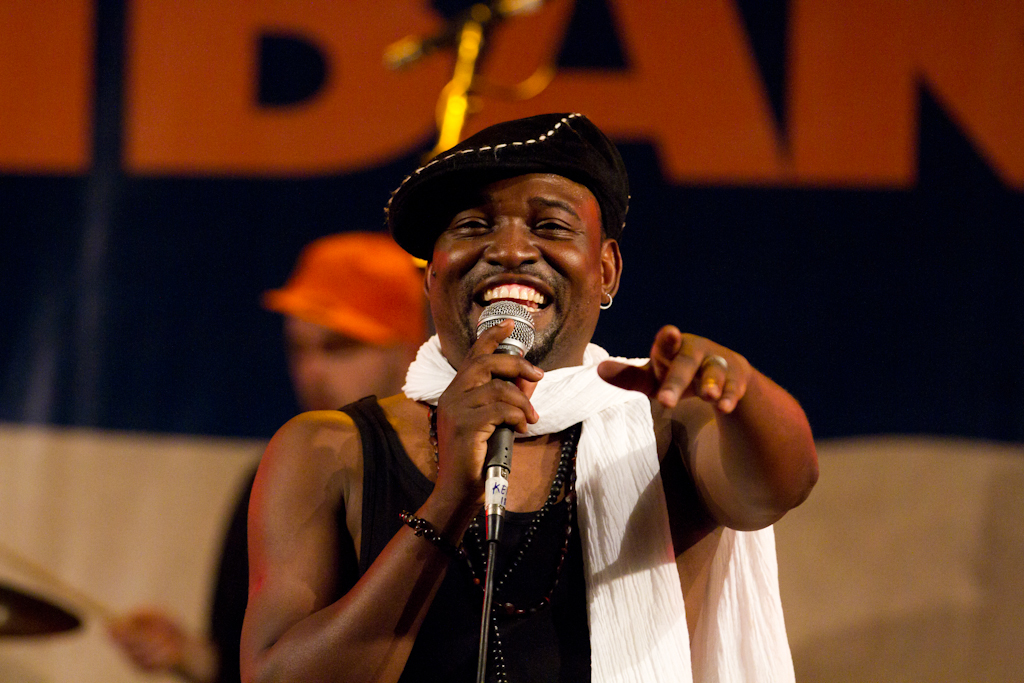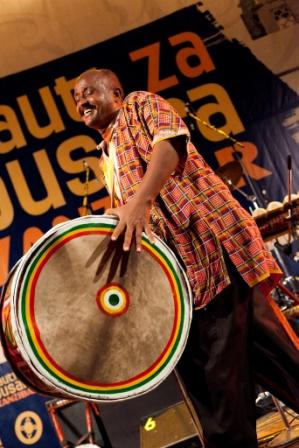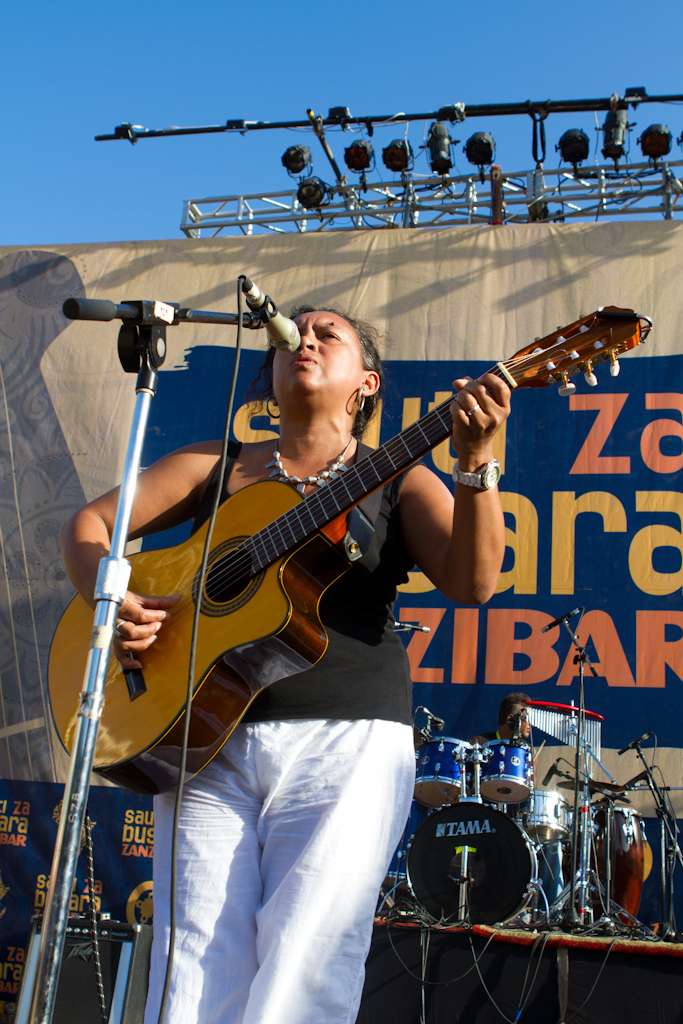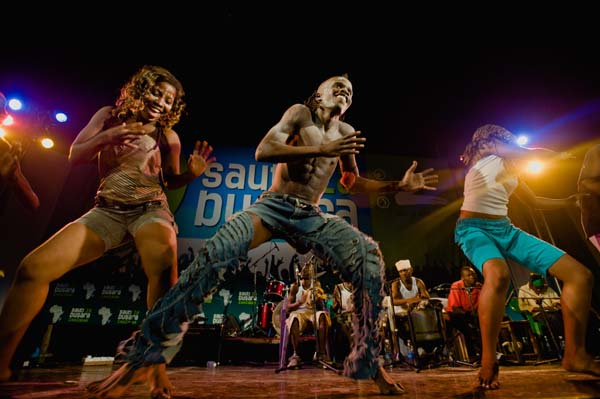The 18th-century Omani fort in Zanzibar is silhouetted against a clear African night. Nneka, a bird-like Nigerian female artist in shabby leggings, is hammering out “Vagabonds in Power” on an open-air stage inside the fort, just metres from a sea of entranced faces. The song is a poke at Africa’s leaders, specifically their part in the Niger Delta mismanagement and related death and corruption scandals. With a voice reminiscent of Nina Simone, and the emotional clout of Billie Holiday, Nneka delights the predominantly African crowd attending the Busara festival. They punch the air, and raise their phones to record the event. For a moment we are no longer in a plastic fantasy holiday island. We are unified: Africans, in a real place, together, singing to our own continent.
It’s tempting to think that political music, protest songs and calls-to-arms are a 20th-century Western invention. Not so. In Africa, the tradition of musician as social commentator, poet (“griot”) and activist is embedded, yet written information about this strand of culture is scarce. The famous 14th-century African library, now destroyed, in dusty Timbuktu reputedly housed manuscripts of Islamic songs, detailed evocations of life, love and the equivalent of “the news”. These days it is musicians like Toumani Diabate in Mali (who comes from a long dynasty of kora players) and Youssou N’Dour in Senegal who keep the musical traditions alive in both form and content.
Watch Nneka sing "Vagabonds in Power"
“Music is inherent to life in my country, and the two must go together,” said legendary Senegalese singer Baaba Maal in 1995. “There is no reason that while you make people dance you can't make them think at the same time. For my people music helps us understand all different areas of our lives. It is an important means of communicating our history, our concerns and our values. Our traditions are carried in music more than in books. We can learn our positions and responsibilities in society through music because within our songs are the proverbs of the culture."
Across the continent, music is intrinsically linked to the process of life, death and everything in between. Audiences feel addressed by their music and they can interact in ways they can’t with their politicians. The idea of songs as being primarily about (erotic, intimate) love is not common.
 This feeling is made explicit at Busara. Freddy Massamba (pictured right) is a charged, small man, with intense eyes and extravagant hand gestures. In 97 per cent humidity - mindless heat - he's sitting on the floor of an old munitions and defence tower in the fort, talking above the euphoric din of a happy crowd outside. A prominent and popular singer from the Democratic Republic of Congo, he says “I prefer not to limit myself: my music is my history. I won’t sing love songs about one person. In my community we are divided by rape, wars and oil and mineral explorations. What we need is love in our communities, not just love between two people. If my village had not been torn apart, if there had been more love, I would not have had to walk for two months to safety.”
This feeling is made explicit at Busara. Freddy Massamba (pictured right) is a charged, small man, with intense eyes and extravagant hand gestures. In 97 per cent humidity - mindless heat - he's sitting on the floor of an old munitions and defence tower in the fort, talking above the euphoric din of a happy crowd outside. A prominent and popular singer from the Democratic Republic of Congo, he says “I prefer not to limit myself: my music is my history. I won’t sing love songs about one person. In my community we are divided by rape, wars and oil and mineral explorations. What we need is love in our communities, not just love between two people. If my village had not been torn apart, if there had been more love, I would not have had to walk for two months to safety.”
His concert is a stirring affair. With sweat dripping and a fist in the air, he asks the audience to wave their lighters “so they can be seen in Palestine! To remember the 48 women an hour raped in DRC and the Congo.”
Clearly musicians are not shy of the difficult subjects. In Africa there are songs, poems, talking drums and rhythmic rituals for childbirth, initiation into adulthood, hunting, getting married and making decisions of both an individual and collective nature. Yet it’s very hard to pinpoint and date very early songs, as they remain in the oral tradition rather than written down.
The hotel reverberates with the sounds of women: a half-open door reveals Sudanese women covered in henna, singing while doing each other’s hair. Da’Affallah, the leader of the Sudanese group Camirata (pictured below) and director of The Music and Arts Academy in Khartoum laughs: “We never ever stop singing!” he says. “Music in Sudan is absolutely everywhere, and has been for many, many centuries. Music is life in Sudan, from birth to death. When the woman makes tea or coffee in the morning she has a special song [he starts singing]. She has a song and she grinds out the pestle in time as she grinds coffee. Then we have special “albaramka” for tea, this is a group song, using our voices.” It sounds like Mongolian throat singing. “If we have problems in the community, we bring together everyone to solve the problem, we consult the elders, we talk, we sing, we talk more!”
 In his elegant embroidered long tunic and Islamic ‘kufia’ (skull cap) Da’Affallah is emphatic that it is not only the content of the music that is important, it is the ritual of performing it that is vital. “In the West you are obsessed with the problems of Sudan. In fact it’s like at the market: one stall is having a problem, that doesn’t mean the whole market is destroyed! In our group we have people from the North, The Nuba, and the South. The fact we sing together is showing people there is a huge amount more to Sudan than just war, Darfur, and death. A musician must be the leader of the community. We are the social critic. The real musician does not go out to nightclubs, but he leads the community to the right way. This means peace, unity, understanding, communication. We must reflect the reality. This chance to play to international audiences is a real chance for us."
In his elegant embroidered long tunic and Islamic ‘kufia’ (skull cap) Da’Affallah is emphatic that it is not only the content of the music that is important, it is the ritual of performing it that is vital. “In the West you are obsessed with the problems of Sudan. In fact it’s like at the market: one stall is having a problem, that doesn’t mean the whole market is destroyed! In our group we have people from the North, The Nuba, and the South. The fact we sing together is showing people there is a huge amount more to Sudan than just war, Darfur, and death. A musician must be the leader of the community. We are the social critic. The real musician does not go out to nightclubs, but he leads the community to the right way. This means peace, unity, understanding, communication. We must reflect the reality. This chance to play to international audiences is a real chance for us."
Although museums such as ILAM at Rhodes University, South Africa, have been assiduous in their efforts to chronicle oral music and its role in Africa, there are huge gaps. Says Freddy Massamba, drumming out the point on the floor: “Franklin Boukaka, an artist in Congo who is locally very well known, is unknown in Europe or the rest of Africa. He sang in the Sixties. His song was a revolutionary classic: 'Some people who eat only meat, compared to those who only can afford vegetables.' He was saying: 'Me, I would love to eat meat, it’s a luxury!' He was asking us to look at the basic differences between us as people - some of us can only eat vegetables and can’t afford meat. Meat is also a reference to rights, to justice, to freedom. Because of this song he was murdered, back in the Sixties.” Manu Chao re-released this song in the Eighties, but it’s still relatively unknown. In the markets of East Africa you can still see the stark contrast, between those who can afford to buy meat and those who stick to maize, spinach and beans.
 The tradition of using similes, metaphors or allusions to address problems is as old as the earth. Says Hanitra, the Madagascan singer/songwriter (pictured right), “You can’t say anything directly. We specialise in being indirect, we sing in riddles. For example, when I sing about flowers not being able to bloom, I am referring to the Malagasy citizens, how we are not being allowed to flourish.” She elaborates: “I have a song, ‘No Freedom Here’. I am talking about my personal freedom, liberty for all - of life, of existence, but I am singing in English! This is for the international market. We have demonstrations, but the Malagasy people don’t really say what they want to say, because there’s no structures for change.” Ironically the current president of Madagascar, Raojolena, is a DJ.
The tradition of using similes, metaphors or allusions to address problems is as old as the earth. Says Hanitra, the Madagascan singer/songwriter (pictured right), “You can’t say anything directly. We specialise in being indirect, we sing in riddles. For example, when I sing about flowers not being able to bloom, I am referring to the Malagasy citizens, how we are not being allowed to flourish.” She elaborates: “I have a song, ‘No Freedom Here’. I am talking about my personal freedom, liberty for all - of life, of existence, but I am singing in English! This is for the international market. We have demonstrations, but the Malagasy people don’t really say what they want to say, because there’s no structures for change.” Ironically the current president of Madagascar, Raojolena, is a DJ.
Where music has been committed to vinyl, things get a little easier. Bands such as the Hallelujah Chicken Run Band were very popular in Zimbabwe in the Seventies. The singers were working miners, practicing when their shifts had finished. Like Thomas Mapfumo and Lucky Dube, also from Zimbabwe, they borrowed sentiments and beats from their heroes Peter Tosh and Bob Marley, whose “Get Up Stand Up” was a massive pre-independence hit.
Academics Mark Pedelty and Herman Wasserman go so far as to describe these musicians as “the new journalists” in Zimbabwe, where the non-government media is spectacularly weak and the public sphere a vague concept. Yet the markets of Nairobi, Dar es Salaam and Kenya rarely stock their records: instead, small corrugated iron lean-tos where pirated CDs or cheap copies are sold are rammed with cassettes.
Later, Hugh Masekela, Ladysmith Black Mambazo and Miriam Makeba defined the soundtrack for anti-apartheid struggle in Eighties South Africa. In dusky shebeens and bars papered with Sunlight washing powder adverts they broadened out the traditional repertoires of township music, singing about the conditions of miners, the pass laws, their long journeys to work and getting caught in bed with someone of the “wrong” race, often in uproarious, mocking slang laden with innuendo that spoke directly to their listeners. This music, like jazz and the penny whistle music of Spokes Mshlane, was political by its very existence.
There’s a lot of pressure here for people to behave in daily life, to restrain themselves. Music is a chance to let go
Said Masekela: “I don't think any musician ever thinks about making a statement. I just came from South Africa, a place that had been in a perpetual uprising since 1653, so the uprising had become a way of life in our culture and we grew up with rallies and strikes and marches and boycotts.… We were fighting real oppression instead of a racial or religious war. I came from those people and I sourced from them”.
Like their modern contemporary, Zimbabwe’s Comrade Fatso, whose music is often banned, they spoke directly to people, performing in townships and shebeens at underground events, and often facing disruption from the authorities. Professor Winston Mano, a British academic, says that in the absence of a critical media, this music creates “communities of resistance”.
 Today in Dar es Salaam in Tanzania, Jagwa Music (pictured), Fid Q, Machuriko and Bongo Flavah perform the same function: the instruments are local (a kids’ Casio toy piano, old oil containers, sticks) and the lyrics improvised and totally relevant to the audiences. This is the music of dirty, unkempt streets, where kids push a small wheel at the end of a wire as a toy and sewage floods people’s houses in the rainy season; where the smells of frying fish, corn on the cob roasting and ‘nyama choma’ (grilled meat) mingle with ever-present dust. As a result, Machuriko and Bongo Flavah are a total hit: young men dance wildly and gigs are sold out, even though they are all in small suburban areas, promoted by word of mouth or SMS. The music borrows heavily from the more radical elements of US originated hip-hop, such as Sean Combs’s “Vote or Die” and Public Enemy’s "Fight the Power" and It Takes a Nation of Millions to Hold Us Back. However it’s still distinctly Tanzanian, and distinctly male, with an emphasis not so much on guns as self-expression, self-definition - and fun.
Today in Dar es Salaam in Tanzania, Jagwa Music (pictured), Fid Q, Machuriko and Bongo Flavah perform the same function: the instruments are local (a kids’ Casio toy piano, old oil containers, sticks) and the lyrics improvised and totally relevant to the audiences. This is the music of dirty, unkempt streets, where kids push a small wheel at the end of a wire as a toy and sewage floods people’s houses in the rainy season; where the smells of frying fish, corn on the cob roasting and ‘nyama choma’ (grilled meat) mingle with ever-present dust. As a result, Machuriko and Bongo Flavah are a total hit: young men dance wildly and gigs are sold out, even though they are all in small suburban areas, promoted by word of mouth or SMS. The music borrows heavily from the more radical elements of US originated hip-hop, such as Sean Combs’s “Vote or Die” and Public Enemy’s "Fight the Power" and It Takes a Nation of Millions to Hold Us Back. However it’s still distinctly Tanzanian, and distinctly male, with an emphasis not so much on guns as self-expression, self-definition - and fun.
Mzungu Kchaa is a Zambian/Danish record promoter and performer who lives in Dar es Salaam and is linked to the emerging bongo flavah hip-hop scene. “People like Professor J sing about relevant things,” he says. “In one of his songs he pretends to be president. It’s funny, he’s promising all these things people know he won’t deliver. It’s a joke. There’s a lot of pressure here for people not to express themselves, to behave in daily life, to restrain themselves. Music is a chance to let go. I used to play Taarab (a traditional form of Zanzibar classical music). The MC would always say 'throw you soul in the air'. He was saying relax, let yourself go.”
Back at the old fort in Busara, the festival director Yusuf Mahmoud thinks that the reason these bands speak so pertinently to their audience is because “music is a tool to bring different backgrounds, religions, ages, cultures and people together. Here in Zanzibar, different religions, tourists and locals, or political parties are at loggerheads. These kind of opportunities are very rare, to bring people together.”
Watch Jagwa Music performing















Add comment